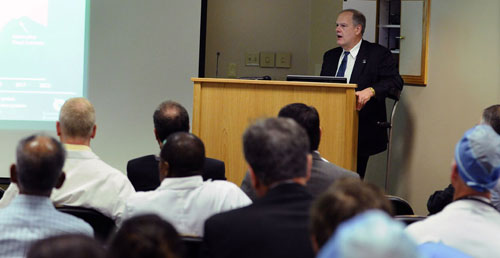National expert addresses health care delivery, costs in wake of reform


One of the biggest drivers of change in health care delivery and costs will be the tremendous expansion of Medicaid under the Patient Protection and Affordable Care Act, according to Stanley Stead, M.D., CEO of the Stead Health Group, a strategic health care consulting group.
Dr. Stead presented “What ‘Accountable’ and ‘Affordable Care’ Mean to Physicians” at Surgical Grand Rounds on Wednesday, Sept. 12. Dr. Stead is a national expert on hospital and health care finance with a focus on new and alternative payment systems. Prior to founding the Stead Health Group, he was senior associate director of the University of California Davis Health System for strategic planning, utilization, perioperative services and risk management.
The Congressional Budget Office estimates Medicaid will expand enrollment by 32 million by 2014. According to Dr. Stead, one third of all people not eligible for Medicare will soon be added to Medicaid.
“Change is coming fast, and we need to meet it head on,” he said.
With a burgeoning Medicaid population and a looming shortage of physicians, health care reform is ushering in new payment models for hospitals and physicians.
“My economic modeling for surgical procedures indicates the shift from uninsured to Medicaid will result in a 9.3 percent increase in case volume,” he said. “The question is whether hospitals and physicians have the capacity to handle this increase.”
The goal of new payment models is to make value a primary driver in treatment decisions. “The models are designed to achieve the same or better patient outcomes at lower costs,” Dr. Stead said.
Some of the new models hospitals and physicians are considering are payment-by-episode and payment for comprehensive care. Episode payments are a single price for all health care services needed during an entire episode of care, such as all inpatient and outpatient care for a hip replacement. Comprehensive care payments are condition- or risk-adjusted fees with a single price for all services needed by a specific group of people for a fixed period. For example, this model would pay for all the care needed for a year for all employees of a company who have chronic diseases such as diabetes.
“We will see a mixed system with all of these including fee for service in use for a while,” he said. “Bundled payments under these models give the biggest bang for the buck.”
A payment-by-episode demonstration project for orthopaedic services at Baptist Health System saved $1 million in just six months. Post-surgical infection rates, length of stay and quality scores improved. “Standardizing medical devices provided half the savings,” Dr. Stead said.
Dr. Stead outlined some of the advantages of a perioperative surgical home model of patient care. He estimates that increased anesthesiologist consultations and techniques to control blood loss during a total joint replacement can achieve nearly $900 in savings.
“Under this model, managing each patient carefully can change outcomes and deliver significant savings,” he said.